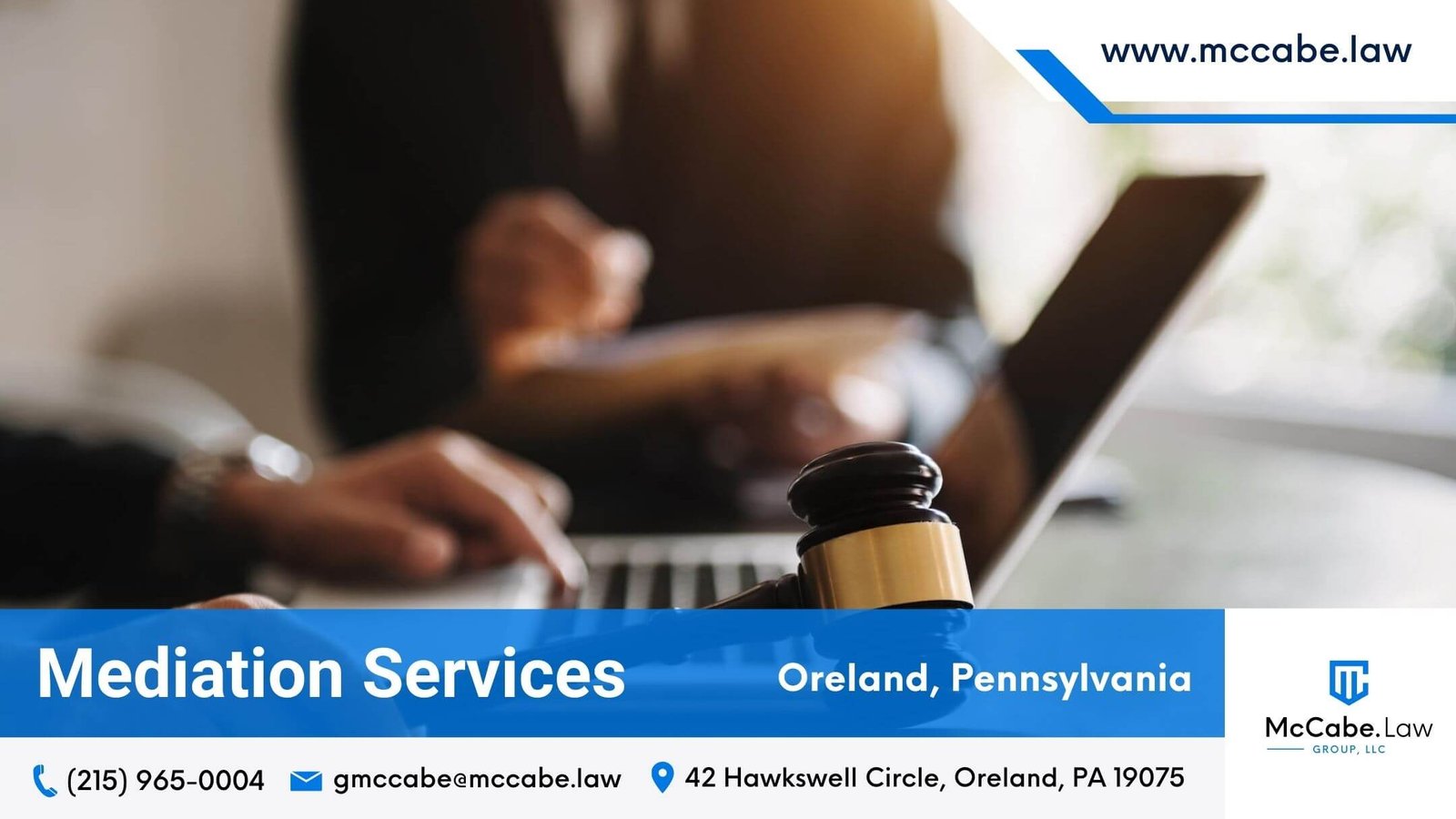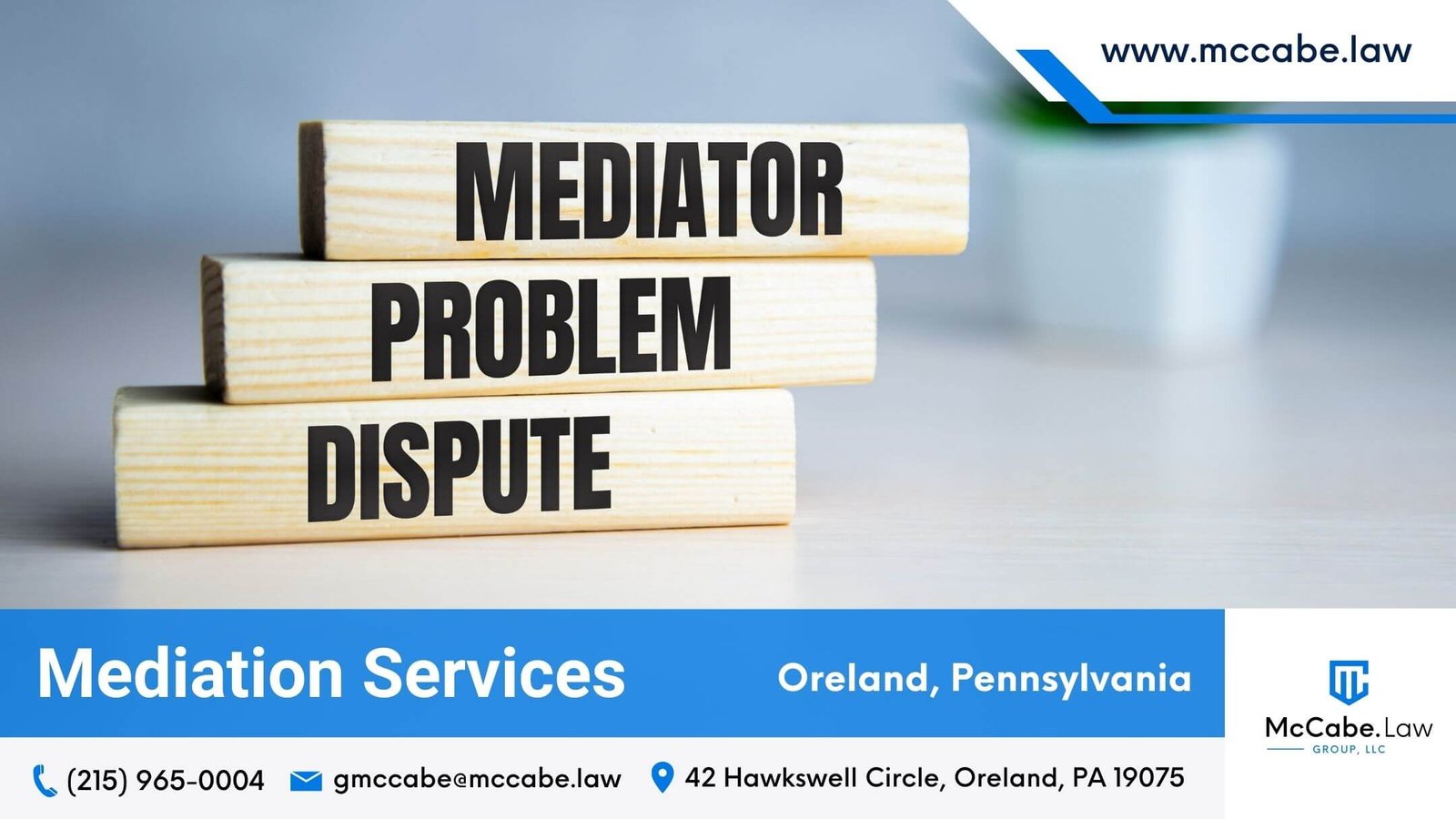Mediation Services
Mediation Services
by McCabe.Law Group, LLC
Mediation is a voluntary, informal procedure in which a qualified neutral mediator aids parties in obtaining a mutually accepted resolution of their disagreement. Mediation is a non-adjudicative process. It is up to the parties to decide if they can agree to resolve the issue and, if so, to choose the terms of the settlement rather than having a court or arbitrator determine the conclusion.
The mediation procedure is wholly optional and confidential. Mediation recognizes the parties’ interests and areas of agreement and works within those areas to construct a suitable settlement for all parties concerned.
Mediation is not appropriate in every instance. Some instances are better suited to litigation, while others are better suited to negotiation. McCabe.Law Group, LLC, can counsel you on mediation and other business law concerns. With over 30 years of experience, Gerard McCabe is a seasoned attorney who excels in transactional and litigation practices in both the public and private markets.
Schedule an Appointment with McCabe.Law Group, LLC
Factors Favoring Mediation
One crucial factor is the ongoing relationship between the parties. Mediation can happen if both parties are genuinely interested in compromise and open to considering the case in a different light. It is also helpful if both parties seek a quick and reasonable option to resolve the dispute. Some choose mediation if the chances of winning at the trial are uncertain. Most people also go through mediation to avoid publicity.
On the other hand, some factors are not inclined toward mediation. It must first be understood whether or not the past settlement was breached by one of the parties and if both parties are not genuinely interested in a compromise. Frivolous cases or the absence of a bona fide dispute is another factor when mediation is not an option.
The Mediation Process: A Step-by-Step Guide

Mediation is a step-by-step procedure that promotes efficient dialogue and negotiation between disputing parties. It usually consists of the following stages:
1. Initial Contact and Orientation
The procedure begins when disputing parties indicate an interest in mediation or are referred by a court or other institution. The mediator or mediation center delivers an orientation, describing the mediation process, its advantages, and the duties of the parties.
2. Introductions
During the first mediation session, each party makes an opening statement describing their position. During this stage, the mediator maintains a courteous and non-confrontational environment.
3. Information Gathering
The mediator fosters the flow of information between the parties, assisting them in understanding each other’s points of view and underlying interests.
4. Identifying the Problem
The parties collaborate to identify the problems and concerns at the heart of the disagreement. This stage establishes the groundwork for problem-solving.
5. Creating Options
The mediator helps the parties develop potential solutions based on the identified difficulties. Creativity is encouraged, and groups are free to experiment with numerous options.
6. Negotiation and Agreement
After generating possibilities, the parties participate in talks to establish a mutually acceptable conclusion. The mediator assists in managing the discussions, ensuring that conversations stay courteous and constructive.
7. Drafting the Agreement
If an agreement is reached, the parties, with the mediator’s aid, create a written agreement stating each party’s obligations and duties. This agreement is usually non-binding unless both parties sign it.
8. Closure
The mediator checks the agreement with the parties to ensure clarity and comprehension. When all parties are pleased, they sign the deal, and the mediation process is completed.
9. Follow-up
Follow-up meetings may be organized to monitor the execution of the agreement and resolve any concerns that may emerge.
Facilitating Effective Mediation
Mediators play a critical role in directing and assuring the success of the mediation process. They use a variety of approaches and strategies to do it.
1. Listening Actively
Mediators attentively listen to both parties, displaying sensitivity and understanding. It promotes accessible communication and trust.
2. Neutral Facilitation
Throughout the process, mediators stay neutral, refusing to take sides or express personal beliefs. This neutrality is required to ensure trust and justice.
3. Conflict Resolution Capabilities
Mediators are:
- Experts in dispute resolution.
- Assisting parties in managing their emotions.
- Addressing underlying issues.
- Finding common ground.
4. Reframe
Mediators restate remarks given by parties in a less hostile or impartial manner. They can assist parties in seeing the issues from a fresh angle and lessen defensiveness.
5. Summarization
Mediators summarize the conversations regularly, ensuring that all parties understand the progress and the remaining issues to be addressed.
6. Reality Check
Mediators may request that parties explore the practical ramifications of their suggested solutions, assisting them in determining the viability of their proposals.
7. Caucus
In certain circumstances, mediators hold individual sessions (caucuses) with each side to discreetly discuss their concerns or ideas. These sessions can be helpful in high-conflict or delicate cases.
8. Idea Generation
Mediators facilitate brainstorming sessions in which participants create different possibilities without immediately passing judgment.
Pennsylvania Mediation Laws and Regulations

Pennsylvania has developed a legislative framework to control mediation services, ensuring the process is fair and ethical. The following are essential components of the state’s mediation legislation and regulations:
1. Confidentiality
The privacy of mediation proceedings is prioritized under Pennsylvania law. Information exchanged during mediation sessions is often inadmissible in court, creating an environment where parties can communicate freely without fear of legal ramifications.
2. Neutrality and Ethics of Mediators
In Pennsylvania, mediators are held to ethical requirements that require them to be neutral, disclose any conflicts of interest, and preserve confidentiality. These requirements are essential for guaranteeing a fair procedure.
3. Informed Consent
To participate in mediation, parties must offer informed permission after thoroughly comprehending the procedure and its ramifications. Mediators are accountable for informing all parties.
4. Accords’ Enforceability
Mediation agreements are typically enforceable in Pennsylvania courts if they fulfill specific legal standards. This enforceability increases the trustworthiness of mediated agreements.
5. Mediation Ordered by the Court
In rare situations, Pennsylvania courts may force parties to mediate before proceeding with litigation. It indicates the state’s dedication to alternative conflict resolution.
Frequently Asked Questions
How Does Mediation Work?
Mediation is voluntary and confidential; a neutral third party helps conflicting parties find a compromise. The mediator helps parties negotiate to resolve disputes without going to court.
When to Consider Using Mediation?
Mediation may be a choice when you want to resolve a problem with a neighbor, business partner, or family member collaboratively and cost-effectively. It can resolve divorce, job, and commercial problems.
Mediation TypicallyTakes How Long?
Mediation length depends on conflict complexity, party cooperation, and other variables. Some mediations take weeks or months to conclude (some in one session). Based on the circumstances, the mediator can estimate better.
Trusted Mediation Services in Pennsylvania

Pennsylvania’s mediation rules and regulations focus on confidentiality and mediator ethics, ensuring fair and trustworthy mediation. Knowing mediation and following legal norms is crucial, as it has become a popular conflict resolution approach.
Mediation Services by McCabe.Law Group, LLC, fosters open dialogue, negotiation, and mutually accepted solutions. We use numerous methods to help parties resolve conflicts.
Get the Winning Class Action Lawsuits You Need!
McCabe.Law Group, LLC
42 Hawkswell Circle, Oreland, PA 19075
(215) 965-0004
Contact Details
- (215) 965-0004
- gmccabe@mccabe.law
- 6172 Argos Drive, Blue Bell, PA 19422
